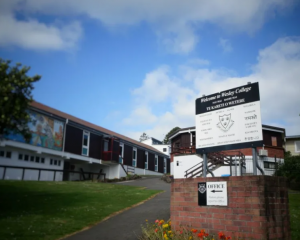
The majority verdicts were revealed to the High Court at Christchurch following more than 14 hours of deliberations.
The 42-year-old had pleaded not guilty to all three murder charges, her legal team mounting a defence based on insanity and infanticide.
The prosecution said the mother killed her children out of "anger and resentment" and the need for control.
The family had only been in New Zealand for a month after emigrating from South Africa.
Dickason’s husband, Graham, had just started working as an orthopaedic surgeon at Timaru Hospital.
"You might think that it is hard to sit here and understand Mrs Dickason’s behaviour that night: ‘Why would a mother do this to her children — she must’ve been so unwell for that to have occurred.’
"They are all natural reactions," Crown prosecutor Andrew McRae said.
"However, while there was no doubt she was significantly unwell with depression, the Crown say she wasn’t so unwell that she has a medical defence available to her."
Dickason’s counsel Kerryn Beaton KC disagreed, and said the defendant was experiencing a severe depressive episode.
"Mothers don’t kill their children the way that Lauren did just because they’re angry, or resentful, or stressed or anxious.
"So the girls’ deaths have nothing to do with anger and resentment, and everything to do with what was clearly a severe mental illness."
Ms Beaton and fellow counsel Anne Toohey appeared stunned as the verdicts were read to the court, before succumbing to tears.
In summing up the case earlier this week, Justice Cameron Mander said the issue between the Crown and the defence was whether Dickason’s disturbed mind was by reason of her not having fully recovered from the effect of giving birth, or by reason of any disorder resulting or arising from childbirth.
The defence argued the major depressive episode that Dickason was suffering not only caused her to think she had to take her own life, but take her children with her.
Ms Beaton said the depressive episode was linked to Dickason’s postpartum depression, which her client never recovered from.
"This is the very kind of case that the law of infanticide was designed for."
The jury has now decided that this was not the case.
Dickason will be detained in hospital awaiting assessment, before a sentencing date is finalised.
The jury heard during the first days of the trial how she endured 17 arduous rounds of IVF due to an inability to conceive naturally.
But dreams of children would eventually become a reality. Liane arrived on September 22, 2014 and twins Karla and Maya would follow four years later, as the couple resorted to donor eggs.
By mid-September 2021, a mother with her back to the wall wanted to "give them back and start over".
The reality of raising three children under 5 was a complication for someone like Dickason, according to the Crown.
"The defendant had a lifelong propensity towards anxiety and perfectionism, always demanding very high standards from herself and a tendency towards self-criticism for any actual, or perceived failure to meet those standards," prosecutor Andrew McRae said.
It was these traits which were strongly at odds with the "unpredictable nature" of children and their behaviour, the court heard.
Dickason reported feeling like a "shaken bottle of Coke, ready to explode" on the day she killed her children.
However, the defence argued she was in the grip of a major depressive episode during this period, a direct consequence of postpartum depression.
A sequence of external factors — Covid-19, South Africa’s political and civil discord, a long-haul emigration, New Zealand’s immigration requirements — only fanned the flames.
Forensic psychiatrist Susan Hatters-Friedman told the court during her testimony that suicide and infanticide were "seriously concerning" risks of the illness.
On the day Dickason killed her daughters, the gravity of the move to New Zealand had hit home.
She told Ms Hatters-Friedman she was by herself for the first time in months and felt hopeless and alone, staring at the ceiling for hours.
"She explained that New Zealand was not at all what she had envisioned."
During a three-hour police interview, Graham Dickason quietly tried to make sense of it all.
Grainy video footage showed a shattered man sitting in the interview room, his posture pivoting from hands clasped to head-in-hands.
Further background about his wife’s lengthy mental health struggles and more recent obstacles during Covid-19 were highlighted, conceding his wife was "not in a good place".
Nearly two years later, Mr Dickason, 46, shared his perspective for the jury.
Speaking from South Africa through an audiovisual link, he said she was prone to periods where she was "quieter and reserved".
"This was different to prior periods," he said.
In court, the defendant looked up at her husband on screen, as he said that despite tiredness and frustrations, there was "no question in his mind" that she loved her children.
The jury heard earlier during the trial’s second week how the family was welcomed by the Timaru community.
A fellow expat from South Africa, Grant Phillips, who was the acting principal and teacher at Timaru Christian School in 2021, had been in contact with the family when they were still in South Africa.
He helped enrol Liane into Timaru Christian School.
The court heard Dickason "felt like a devil was on her shoulder".
Forensic psychiatrist Dr Ghazi Metoui, who spent a total of 20 hours with Dickason from December 2021, was also told about the same demonic presence, the court heard.
"I feel like a seed was planted that day," she said to Dr Metoui.
Another specialist witness, Dr Justin Barry-Walsh, believed the mother was in the grips of rapidly worsening depression and overwhelmed by a "negative and nihilistic worldview".
He said she believed killing the children "seemed right" and was "morally correct" at the time.
The jury, however, did not.
By Adam Burns












